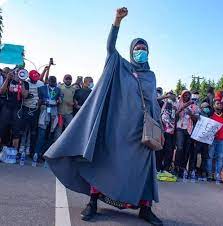
Feminism in Africa is a complex movement that deals with a variety of issues concerning gender equality, women’s rights, and social justice across the continent. The movement is influenced by a range of perspectives, experiences, and struggles, which are shaped by historical, cultural, and socio-economic contexts.
Feminist movements in Africa have a long history that dates back to pre-colonial societies, where women played important roles in various aspects of community life. Unfortunately, after the arrival of colonial powers, patriarchal structures were imposed, which marginalized women and restricted their rights and opportunities. After independence, feminist activism gained momentum, and women across Africa mobilized to challenge discriminatory laws, customs, and social norms.
Feminism in Africa is a multifaceted movement that strives to address a wide range of issues related to women’s rights and gender equality. Some of the key areas of focus include legal rights, education, healthcare, economic empowerment, political participation, and violence against women. Legal rights: In this context, feminism seeks to advocate for legal reforms that eliminate discriminatory laws and ensure equal rights and opportunities for women in areas such as inheritance, property ownership, marriage, and employment. This involves pushing for the creation of laws that promote gender equality and challenge traditional cultural practices that perpetuate gender-based discrimination. Education: Access to quality education is also a critical area of focus for feminism in Africa. The movement seeks to promote education for girls and women and address the barriers that prevent them from accessing education. Such barriers include gender-based violence, early marriage, and cultural beliefs that prioritize boys’ education over girls’. By promoting access to education for girls and women, feminism aims to empower them with knowledge and skills to participate fully in society. Healthcare: Feminism in Africa also advocates for comprehensive healthcare services that address issues such as reproductive health rights, access to contraceptives, maternal healthcare, and harmful traditional practices such as female genital mutilation (FGM) and child marriage. By advocating for these healthcare services, feminism aims to improve women’s health outcomes and ensure that they have control over their reproductive health. Economic empowerment: The movement also supports women’s economic empowerment through entrepreneurship, access to credit and resources, equal pay for equal work, and challenging discriminatory practices in the workplace. By empowering women economically, feminism aims to reduce poverty and promote gender equality. Political participation: Encouraging women’s participation and leadership in politics, governance, and decision-making processes at all levels is also a critical area of focus for feminism in Africa. This involves advocating for gender quotas and affirmative action policies that promote women’s representation in positions of power. Violence against women: Addressing gender-based violence, including domestic violence, sexual assault, trafficking, and harmful traditional practices, is also a key area of focus for feminism in Africa. The movement aims to create legal and social measures that protect women and girls from violence and ensure that perpetrators are held accountable for their actions. By addressing violence against women, feminism aims to create a society where women can live free from fear and violence.
Feminism in Africa acknowledges that women’s experiences vary depending on several factors such as race, ethnicity, class, religion, sexual orientation and disability. Intersectional feminism emphasizes the interconnectivity of various forms of discrimination and oppression faced by women, underscoring the need for comprehensive and inclusive approaches to feminist activism.
Feminist movements in Africa encounter numerous challenges in their quest for gender equality. Such challenges include opposition from conservative forces, cultural barriers, lack of resources, and institutional resistance to change. Traditional and religious beliefs perpetuate patriarchal norms that hinder progress towards gender equality. Furthermore, political instability, conflicts, and humanitarian crises in some regions present additional obstacles to feminist activism.
Feminism in Africa has faced challenges, but it has also achieved significant milestones and made tangible impacts. Legal reforms have been enacted to protect women’s rights, increase their representation in political and decision-making roles, and address gender-based violence. Grassroots organizations, women’s rights activists, and feminist scholars have all played vital roles in raising awareness, building networks, and advocating for policy changes. African feminists have also contributed to global discourses on gender equality. They have challenged stereotypes, amplified marginalized voices, and reshaped narratives about African women’s agency, resilience, and contributions to society.
The future of feminism in Africa relies on continuous advocacy, mobilization, and collaboration across sectors and regions. To drive sustainable change and tackle complex challenges like economic inequality, climate change, and digital divides that disproportionately impact women and girls, it is essential to strengthen partnerships between civil society, governments, academia, and international organizations.
In summary, feminism in Africa is an evolving movement that aims to achieve gender equality, social justice, and human rights. By addressing systemic barriers, promoting inclusive approaches, and amplifying diverse voices, African feminists are leading the way for a more equitable and inclusive continent where every woman and girl can realize their full potential.



